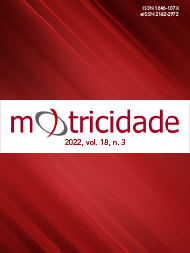Correlation between creatine kinase (CK) and thermography: a systematic review with meta-analysis
DOI:
https://doi.org/10.6063/motricidade.26751Keywords:
Skin Temperature, Thermal Imaging, Muscle DamageAbstract
This research aimed to investigate the association between the skin temperature variation of the skin identified by thermography and serum CK values in healthy subjects based on a systematic review with meta-analysis. A systematic literature search was performed in June 2021 in the SCOPUS, MEDLINE, and Web of Science databases (2000 to 2021). MeSH and DeCS platforms were used to find the descriptors in English referring to the terms "thermography" and "creatine kinase" with their synonyms (nine and 13, respectively) to find studies, following the PIRT strategy: Participants (healthy subjects); Index Test (thermography); Reference Test (CK collection); Target Condition (having analysed the results of the Index and Reference Test). A meta-analysis was performed to calculate the association between variables. A total of 483 files were retrieved from the databases, and 13 were selected for analysis (five met the criteria for meta-analysis). Considering the 13 studies reviewed, there is a general balance in obtaining results of CK increase along with skin temperature versus studies that didn't observe any association between the measures. However, the meta-analysis showed no significant association between the variables analysed (r= –0.05; p= 0.06; 95%CI –0.11 – 0.00). This result suggests that the result of one test cannot estimate the result of the other. It was concluded that there is no good association between CK levels and thermography results; it's recommended the use of thermal images in addition to other evaluation methods in order to assist in the determination of special differential diagnoses of musculoskeletal injuries.
PROSPERO registration number CRD42021262109
Downloads
Published
Issue
Section
License
The authors of submitted manuscripts must transfer the full copyright to Journal Motricidade / Sílabas Didáticas Editions. Granting copyright permission allows the publication and dissemination of the article in printed or electronic formats, and copyrights start at the moment the manuscript is accepted for publication. It also allows Journal Motricidade to use and commercialise the article in terms of licensing, lending or selling its content to indexation/abstracts databases and other entities.
According to the terms of the Creative Commons licence, authors may reproduce a reasonable number of copies for personal or professional purposes, but without any economic gain. SHERPA/RoMEO allows authors to post a final digital copy (post-printing version) of the article on their websites or on their institutions' scientific repository.


